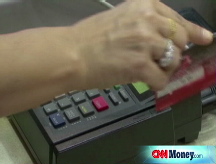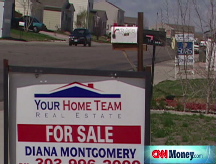Freddie, Fannie: Fuel for the bank stock rally
Banks' road to recovery will be easier given the Freddie-Fannie bailout but experts worry the recent upswing could stall.
 |
| The S&P Bank Index and KBW Bank Index enjoyed a nice bounce Monday after the U.S. government assumed control of Fannie Mae and Freddie Mac, sustaining the sector's recent rally. |
NEW YORK (CNNMoney.com) -- The U.S. government's unprecedented rescue of Fannie Mae and Freddie Mac over the weekend could be just the fuel needed to keep the recent bank stock rally going.
Financial stocks soared Monday in the wake of the weekend announcement, as investors bet the move would bring some much-needed relief to not only the U.S. housing market but the nation's banks as well.
Leading the charge were some of the institutions that have been hard hit by the mortgage crisis, such as investment bank Merrill Lynch (MER, Fortune 500), which rose about 3% and Citigroup (C, Fortune 500), which gained more than 6%.
Other banks that analysts say have been better positioned to handle the credit crunch, including Wells Fargo (WFC, Fortune 500) and JPMorgan Chase (JPM, Fortune 500), also enjoyed a nice pop on the news. JPMorgan Chase rose about 5% and Wells Fargo's stock gained over 7% during the session.
"We've seen money start to flow into the financial stocks," said Art Hogan, chief market strategist at Jefferies & Co. "Freddie and Fannie are much more important to the nation's financial system than anyone has really given them credit for."
But investors also separated the wheat from the chaff Monday as shares of institutions perceived to be still in a very tough spot, such as savings and loan Washington Mutual (WM, Fortune 500), which ousted its CEO Kerry Killinger Monday, and investment bank Lehman Brothers (LEH, Fortune 500), fell about 4% and 13% respectively.
As a group, bank stocks still remain about 40% below their 52-week highs. But Monday's rally extends the recent run they have enjoyed since mid-July.
Overwhelming fears about the health of Fannie (FNM, Fortune 500) and Freddie (FRE, Fortune 500) at that time and further bank failures following the collapse of the troubled California-based mortgage lender IndyMac sent many bank stocks to their lowest point of the year.
Two of the most closely watched measures of the industry's performance - the KBW Bank Index and the S&P Bank Index - finished last week up 42% and 51% percent respectively since mid-July.
On Monday, the two headed higher with the KBW Bank index surging 6% and the S&P Bank Index climbing 3%.
By agreeing to take over Fannie and Freddie, the government enacted its boldest move to date aimed at propping up the U.S. housing market and the broader economy.
While that plan effectively put some banks who invested in preferred shares of the twin mortgage buyers at risk of losses and possibly even failure, the consensus among experts is that the move is a net positive for the nation's banking system.
For one, it would stabilize the secondary market for mortgages and help bring down stubbornly high mortgage rates, Lehman Brothers analyst Jason Goldberg wrote in a research note published Monday.
That could help home prices, which have been in free fall for the last two years, find a bottom. It may also possibly bring to an end the painful string of writedowns and losses that financial institutions have had to endure for more than a year.
"We have few more things to get solved here but the Freddie-Fannie situation was one thing that needed to get done," said Anton Schutz, president of Mendon Capital Advisors, a firm that invests in financial stocks. "Does this solve everything? Absolutely not."
One nagging concern that continues to swirl around the nation's banks is the state of both commercial lending and consumer credit.
Many banks have reported a surge in bad loans in recent months as businesses and consumers struggle to keep up with their payments as the economy has soured.
Just last week, the Labor Department revealed that the rate of unemployment spiked during the month of August. With more Americans out of work, banks could see further deterioration in the health of their credit card and auto loan portfolios.
Many analysts are betting that those very same problems will take center stage when banks start reporting their third-quarter results. Lehman, for example, will report its fiscal third-quarter numbers on September 18 and analysts expect the company to post a loss of $2.59 per share.
Financial services firms in the S&P 500 are expected to report a 54% decline in profits from a year ago, according to Thomson Reuters.
What's also worth considering is that Monday's rally is not the first time that bank stocks have soared only to come plummeting back to earth.
Earlier this year, shares of many bank stocks rallied by about 20% following a rough end to 2007 only to decline steadily thereafter, bottoming out following the implosion of Bear Stearns in March.
The industry staged another double-digit percentage recovery shortly thereafter, climbing 14% between mid-March through May, only to sink to new lows by mid-July.
The government's action to save Freddie and Fannie could help them from falling below the levels reached in mid-July.
Still, it could be a slow recovery from here on out. Given the lingering credit issues and ongoing market volatility, it may be tough for bank stocks to head much higher in the near-term.
"There is no reason for me to think [bank] stocks will go up straight up from here," said Bill Andrews, a portfolio manager for the Pittsburgh-based money manager C.S. McKee. "We could bounce along the bottom for quite some time." ![]()




